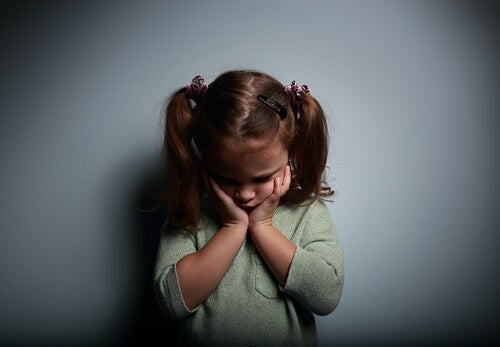Feelings of Emptiness and Loneliness in Children

Feelings of emptiness and loneliness are quite common. We’re sure you’ve experienced them at some point. But can you recognize them in your children? They also feel hopeless, alone, and uneasy, even if there’s no apparent reason for it.
This is a difficult sensation to describe, but whoever has experienced it can easily recognize it. It’s the feeling that our life is meaningless and lacks a solid purpose, a goal. Are you wondering if feelings of emptiness also affect children? Keep reading to find out!
Feelings of emptiness and loneliness in children
Children feel empty and alone, just like adults. The reasons for such distress are a lot more similar to the feelings experienced by adults than we think.
For example, we all suffer when they don’t feel accepted by our nearby circles. It leads us to develop that common feeling of emptiness that we just can’t fill or don’t know how to do so. The same thing happens to children.
Many children don’t feel affection coming from their attachment figures, which leads them to develop an emotional vacuum that, in many cases, ends up becoming an affective deprivation syndrome. It’s a psychological imbalance that occurs when the child suffers from emotional deprivation. Thus, they express it with hostile behavior towards their attachment figures. Also, through feelings of dependence, anxiety, jealousy, and dissatisfaction or a need for constant affection.
As parents, nothing hurts us more than knowing that our children feel that way. Therefore, there are some things we can do about it to try to keep them from feeling emotionally empty. As parents, we must try to make our children feel as safe and loved as possible.
How to prevent feelings of emptiness and loneliness in children

It’s true that, sometimes, as much as we try, it’s difficult to coordinate our schedule with that of our children. Our daily duties, work schedules, French classes, the gym, sports, and homework take a toll on our family life.
Sometimes, all we need is a set agenda with which to reconcile our life and that of our children. Because this lack of time has a huge impact on the need to take care of our family ties and bonds.
Here are some guidelines to become aware of this reality and avoid it:
- Make your children feel important and show them how much you love them. It’s essential that your children feel loved and important. Phrases such as “I love you so much” or “I feel great when you hug me when I get home” will make them feel great and will boost their well-being. In addition, you’ll foster a safe affective bond and their improve their feeling of belonging.
- Spend quality time together. Give them your full attention. Turn off your cell phones. Have real, intimate, and transcendent conversations. Talk about life, dreams, and goals. Sharing your thoughts with them will lead to sharing theirs with you.
- Do nice things for your children other than buying or giving them things. Having your time is valuable to them, but it must be quality time. There are many simple things you can give them that don’t involve investing time or money. For example, call them when you’re on your way home, leave them a note in the morning wishing them a good day, or pick them up before their extracurricular activities to do something unexpected with them.

In children, emotional emptiness is more related to the lack of adequate love ties and not so much to a lack of meaning or feeling uncertain about the future. (Unfortunately for them, that’ll come eventually).
Thus, when a child feels safer and more loved, it’ll be easier for them to develop healthy self-esteem and self-knowledge. Also, this will lead to an adequate sense of security in their relationships, which will probably make them more resilient adults. Here’s to resilience! It’s a great skill that will undoubtedly help them face their life with a better attitude.
Feelings of emptiness and loneliness are quite common. We’re sure you’ve experienced them at some point. But can you recognize them in your children? They also feel hopeless, alone, and uneasy, even if there’s no apparent reason for it.
This is a difficult sensation to describe, but whoever has experienced it can easily recognize it. It’s the feeling that our life is meaningless and lacks a solid purpose, a goal. Are you wondering if feelings of emptiness also affect children? Keep reading to find out!
Feelings of emptiness and loneliness in children
Children feel empty and alone, just like adults. The reasons for such distress are a lot more similar to the feelings experienced by adults than we think.
For example, we all suffer when they don’t feel accepted by our nearby circles. It leads us to develop that common feeling of emptiness that we just can’t fill or don’t know how to do so. The same thing happens to children.
Many children don’t feel affection coming from their attachment figures, which leads them to develop an emotional vacuum that, in many cases, ends up becoming an affective deprivation syndrome. It’s a psychological imbalance that occurs when the child suffers from emotional deprivation. Thus, they express it with hostile behavior towards their attachment figures. Also, through feelings of dependence, anxiety, jealousy, and dissatisfaction or a need for constant affection.
As parents, nothing hurts us more than knowing that our children feel that way. Therefore, there are some things we can do about it to try to keep them from feeling emotionally empty. As parents, we must try to make our children feel as safe and loved as possible.
How to prevent feelings of emptiness and loneliness in children

It’s true that, sometimes, as much as we try, it’s difficult to coordinate our schedule with that of our children. Our daily duties, work schedules, French classes, the gym, sports, and homework take a toll on our family life.
Sometimes, all we need is a set agenda with which to reconcile our life and that of our children. Because this lack of time has a huge impact on the need to take care of our family ties and bonds.
Here are some guidelines to become aware of this reality and avoid it:
- Make your children feel important and show them how much you love them. It’s essential that your children feel loved and important. Phrases such as “I love you so much” or “I feel great when you hug me when I get home” will make them feel great and will boost their well-being. In addition, you’ll foster a safe affective bond and their improve their feeling of belonging.
- Spend quality time together. Give them your full attention. Turn off your cell phones. Have real, intimate, and transcendent conversations. Talk about life, dreams, and goals. Sharing your thoughts with them will lead to sharing theirs with you.
- Do nice things for your children other than buying or giving them things. Having your time is valuable to them, but it must be quality time. There are many simple things you can give them that don’t involve investing time or money. For example, call them when you’re on your way home, leave them a note in the morning wishing them a good day, or pick them up before their extracurricular activities to do something unexpected with them.

In children, emotional emptiness is more related to the lack of adequate love ties and not so much to a lack of meaning or feeling uncertain about the future. (Unfortunately for them, that’ll come eventually).
Thus, when a child feels safer and more loved, it’ll be easier for them to develop healthy self-esteem and self-knowledge. Also, this will lead to an adequate sense of security in their relationships, which will probably make them more resilient adults. Here’s to resilience! It’s a great skill that will undoubtedly help them face their life with a better attitude.
This text is provided for informational purposes only and does not replace consultation with a professional. If in doubt, consult your specialist.







